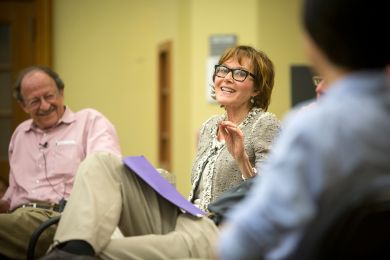Distinguished panel discusses role of creativity in science
Nobel laureate Randy Schekman recalled a defining moment early in his career, when he was an assistant professor and a graduate student called him excitedly and showed him a discovery relating to protein secretions and vesicles in yeast cells.
“I knew at that moment I would be busy on this path for the next 20 years,” said Schekman, a co-recipient of the 2013 Nobel Prize in physiology or medicine and a Howard Hughes Medical Investigator at the University of California, Berkeley.
Schekman was one of four panelists at the “Creativity Spark” workshop for scientists, hosted July 25 on campus by the Leadership Program for Veterinary Students. The event was moderated by Rick Cerione, the Goldwin Smith Professor of Pharmacology and Chemical Biology at Cornell’s College of Veterinary Medicine and College of Arts and Sciences.
When describing one of the most exciting moments in her career, panelist Xiaowei Zhuang, the David B. Arnold Jr. Professor of Science and a professor of chemistry and chemical biology and of physics at Harvard University, talked about the eureka moment that helped her develop a novel method for visualizing biological structures using “super-resolution” fluorescent microscopy.
She recalled the moment when, while “lying in bed,” she realized she could borrow ideas of a binary code found in high-throughput digital communications and apply it to “directly visualizing what was happening inside the cell but also in a systematic, high-throughput way.”
Panelist Harold Varmus, co-winner of the 1989 Nobel Prize in physiology or medicine and the Lewis Thomas Professor at Weill Cornell Medicine, talked about a moment early in his career at the National Institutes of Health during the Vietnam War, prior to current technological advancements in genetics, when he developed a test (called an assay) to measure an enzyme catalyst in cells. He said he realized, “a key to success in science is not always creativity ... but it’s having an assay, a way to measure stuff,” he said. He also was spurred in his research by having “gossip to tell my colleagues” of how he discovered the assay.
When Cerione asked whether discoveries were more influenced by a scientist’s natural abilities or whether the environment of mentors and colleagues nurtured them, Zhuang said her mentors taught her how to “have a big vision and to identify important problems to work on,” she said.
Varmus said while creativity may play a role, “so does book learning,” so one is prepared and can recognize when chance provides an opportunity for discovery. But discovery also depends on the immediate “environment in which people work … and then there’s a national environment” that supports science and allows it to flourish, he said.
Schekman said, “To me, the most important thing to building a career is to focus all of your energy on something new, and not to just do what everyone else is doing.”
Zhuang added, “You can only focus on a problem … or career, if you actually really love it ... that love or passion can drive your focus and drive your success.”
Regarding passion, panelist Lynne Maquat, the J. Lowell Orbison Endowed Chair and professor of biochemistry and biophysics and of oncology at the University of Rochester Medical Center, said, “It’s really important to love what you do, but let’s face it, you’re not going to love it every day.” She added success is hard and one must “chip away every day.”
The panelists also discussed how the funding climate affects young researchers; imbalances in scientific publishing, where inordinate weight is given to three major journals – Cell, Science and Nature – and where a study’s worth is defined by citations that are an arbitrary measure for evaluating a study’s importance; and women in science, an area where Maquat has been a leader.
The event was sponsored by the College of Veterinary Medicine, the Office of the Vice Provost for Research and the Royal Canin Pet Food Corp.



